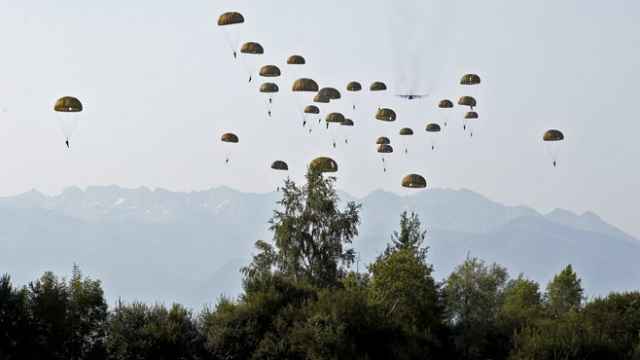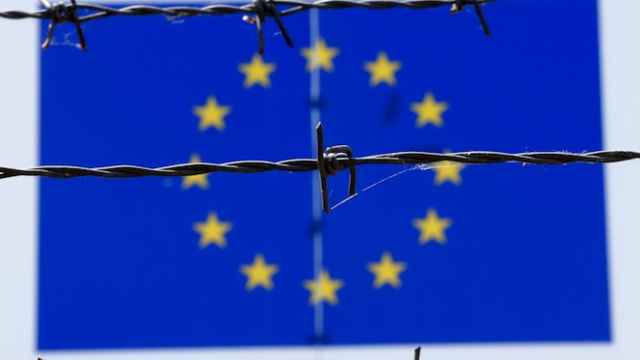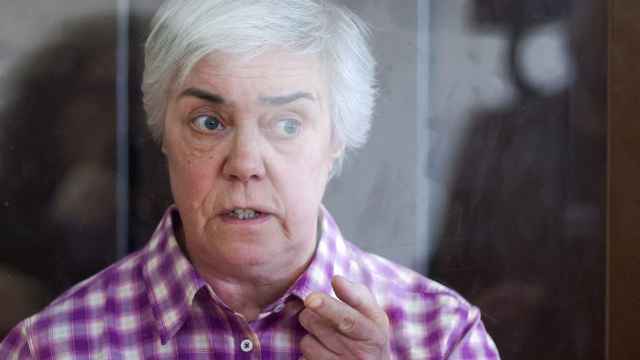CHISINAU — Mircea Blajinu had been looking forward to expanding his 200 hectare apple and nut plantation in northern Moldova this year. But a credit squeeze in Europe's poorest country — hit by one of the biggest bank frauds in history — has killed off his hope of subsidies and forced him to drop his plans.
Pensioner Vissarion Cheshuyev, 65, like thousands of his peers, looks on angrily as his pension, now standing at $306 a month, plummets in value as he scrambles to keep up with government hikes in the price of gas, electricity and central heating.
In Chisinau, Moldova's run-down capital, scores of anxious people mill around in blistering sunshine outside a bank's premises, alarmed by reports it will soon be closed down.
A new government that squeaked into office by the slenderest of margins has now to wrestle with the fall-out from an egregious scam that has robbed $1 billion from the banking system — roughly one eighth of Moldova's gross domestic output.
The fraud has tarnished the image of the pro-Europe ruling class for ordinary Moldovans, many of whom struggle by on a baseline family income of around $300 a month. And it has shaken the confidence of Western allies and international lenders which help keep Moldova's economy afloat.
The affair has exposed entrenched corruption and highlighted the corrosive rivalry between oligarch groups which might yet derail the ex-Soviet state from its avowed course towards European integration.
And all this is taking place as the Moldovan leadership, conscious of strong pro-Russian feeling in parts of the country, especially in the self-proclaimed Transdnestr republic, looks nervously at Russian pressure on Ukraine next door.
Hemorrhaging Money
It was in November last year that the National Bank of Moldova bowed to the inevitable and took three banks — reduced to insolvency by a hemorrhage of money through a web of toxic loans, asset swaps and shareholder deals — under special administration.
An investigation commissioned by the Kroll consultancy pointed the finger at a local billionaire, Ilan Shor. He has since been placed under court supervision though few people last week could say for certain whether he was in the country or abroad.
But most insiders have no doubt that the fraud — which had been going on for years until it hit a peak in 2014 — reflects deep-seated corruption in Moldova and involved some degree of complicity from many of those at the top of power since 2009.
"The authorities knowingly allowed activities to proceed whose inevitable consequence could only be big losses to depositors or taxpayers," commented Alex Kremer, country manager of the World Bank which is holding up payment of $45 million in budget support because of the crisis.
Under pressure from international lenders, Valeriu Strelet, who has taken over as prime minister after his predecessor was squeezed out by a scandal over the validity of his school diplomas, has ordered the three banks — Banca de Economii, Banca Sociala and Unibank — to be liquidated.
And he has set in motion moves to hire financial investigation teams to track down the missing millions abroad.
"We are counting on the cooperation of (foreign) governments where these accounts are found, but I know it will be quite a long process and not an easy one," Strelet said in an interview with Reuters.
But the fetid state of Moldovan politics, dominated by vicious in-fighting between rival oligarchs within the ruling pro-EU alliance rather than by conventional organs of power, could doom the best intentions.
Oligarch Games
Since 2009, Moldova, wedged between Ukraine and EU member Romania, has been run by a three-party alliance — the Liberals, the Democrats and the Liberal Democrats — that took over after years of communist rule and swerved the country towards joining the European mainstream.
It has always been a strained relationship, with the three party leaders showing scant public respect for one another at times of crisis.
The two major power-brokers and rivals for influence are rich businessmen Vlad Filat, head of the Liberal Democratic party, and Vladimir Plahotniuc, Moldova's wealthiest oligarch and a political kingmaker.
Filat was prime minister from 2009 until he fell in April 2013 amid charges of corruption.
Liberal party leader Mihai Ghimpu once described him publicly as "the smuggler-in-chief," a reference to unsubstantiated allegations of involvement in cigarette contraband, which Filat denies.
Plahotniuc, paymaster for the Democrats who amassed a fortune in banking, hotels and petrol stations and owns several TV channels, has been publicly criticized by Filat for using his wealth to exert control over the courts and the police.
The banking affair has already come close to Filat's door with his brother-in-law and nephew being detained by police for 32 days pending investigation by the prosecutor's office for suspected involvement in the scam.
Going on for Years
Back to the missing $1 billion.
Since the three banks collapsed, it emerged that Banca de Economii in particular had functioned as a milk-cow, pushing out unsupported loans sometimes with the sketchiest of paperwork.
This increased after the government somehow lost its controlling share in the bank in 2013. Despite several warnings from the International Monetary Fund, the pace of money going out only quickened through 2014 as a November parliamentary election drew near.
"The events of the latter half of 2014, and in particular November 2014, show a coordinated effort involving all three banks to extract as much loan finance as possible from the banks without any obvious business rationale for the increased exposure," the Kroll report said.
Tracking the money has proven difficult. According to Kroll, in November Banca Sociala took on about $1 billion in Banca de Economii's loans, then sold them on to a shell company in the United Kingdom and finally to the Baltics. Much of the paperwork on the lending vanished, the documents having found their way into the back of a van torched on the side of the road.
The National Bank covered the failed banks' obligations to depositors, including pensions and social payments, to the tune of 13.5 billion lei, then about $1 billion.
People's cynicism runs deep. At "Propaganda," a new fashionable bar in central Chisinau, 250 lei (13 dollars) will buy you a T-shirt bearing the slogan "Where's the one billion dollars?"
Meanwhile, the pro-Russian left, which wants deeper economic cooperation with Russia rather than integration with Europe, is reveling in the pro-EU lobby's discomfort.
"This government will end up where it belongs — in court," Socialist party leader Igor Dodon said.
Moldova-watchers say the fraud is the natural product of deeply-ingrained corruption. The World Bank's Kremer, in a blog, cites figures showing corruption is on the increase with, for instance, the percentage of firms saying they had to pay a bribe to get a construction permit rising from 23 percent to 43 percent during 2008-13.
All this deters possible foreign investment even as the economy struggles with a downturn caused by recession in Russia that has hit both exports and remittances from Moldovan workers, many of whom work abroad.
The bailout of the looted banks led to rapid depreciation in the national currency, the leu, stoking inflation and leading to tough monetary policies that have caused a credit squeeze.
National Bank governor Dorin Dragutanu, under fire himself for apparently disregarding early IMF warnings, says he wanted to take the three banks under administration much earlier than last November but was prevented from doing so.
He says he had no choice but to raise the basic bank rate five times this year, to 17.5 percent from 4.5 percent, to keep money in the system.
That is little comfort to the farmer, Blajinu, starved of credit, and pensioner Cheshuyev, and thousands like them who fear the near-collapse of the banking system could yet rebound on salaries and pensions.
"There are no subsidies at all for us farmers now. The theft of the money and the freezing of financing by the EU and World Bank has meant a suspension of all money from the state except salaries and pensions," Blajinu said.
An IMF mission is now expected in Moldova from Sept. 21 — a visit which may lead to a new bailout program which could unlock withheld budgetary support money from the EU and the World Bank.
A Message from The Moscow Times:
Dear readers,
We are facing unprecedented challenges. Russia's Prosecutor General's Office has designated The Moscow Times as an "undesirable" organization, criminalizing our work and putting our staff at risk of prosecution. This follows our earlier unjust labeling as a "foreign agent."
These actions are direct attempts to silence independent journalism in Russia. The authorities claim our work "discredits the decisions of the Russian leadership." We see things differently: we strive to provide accurate, unbiased reporting on Russia.
We, the journalists of The Moscow Times, refuse to be silenced. But to continue our work, we need your help.
Your support, no matter how small, makes a world of difference. If you can, please support us monthly starting from just $2. It's quick to set up, and every contribution makes a significant impact.
By supporting The Moscow Times, you're defending open, independent journalism in the face of repression. Thank you for standing with us.
Remind me later.





